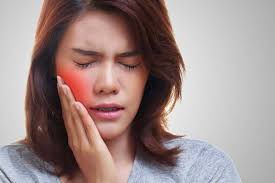September 8, 2019

Have you ever woken up with a sore jaw? Do your teeth feel worn down or sensitive to hot and cold foods and drinks? Then you might be grinding or clenching your teeth while you sleep. Although this might seem like a harmless habit, teeth grinding can negatively impact your oral health. Let’s take a closer look at what can happen if you ignore teeth grinding.
What Causes Teeth Grinding?
Teeth grinding, also known as bruxism, is defined as an unconscious gnashing, grinding, or clenching of the teeth, either when you’re awake or while you’re asleep. There’s not usually one single cause behind teeth grinding. Oftentimes, stress is a big contributor to bruxism. It could also be a problem with your temporomandibular joint, or your TMJ. This is the joint just under your ear that allows your jaw to move. Grinding could be related to orthodontic work, like braces or a retainer. Whatever the case may be, it’s important to deal with it as soon as possible.
What Happens If You Don’t Get Bruxism Treated?
Frequently grinding your teeth can lead to chronic pain in your face and jaw, and particularly in your TMJ. This is referred to as TMJ disorder, or simply TMJ. Additionally, your teeth could gradually become worn down over time. They could become more susceptible to sensitivity, as well as tiny fractures. If you chew something hard, like popcorn kernels or ice, you’re more likely to chip a tooth. Your jaw can also become so stiff that it could compromise your ability to chew, or even to open or close your mouth all the way.
How Can Your Dentist Treat Your Bruxism?
The first step to getting your bruxism dealt with is to see your dentist. They can usually recognize the signs of teeth grinding. Once they determine the cause, they can come up with a treatment plan that fits you best. This might involve wearing a nightguard, or a plastic tray worn over the teeth when you go to sleep to prevent harmful contact. Your dentist may also prescribe Botox injections to relax the muscles in your jaw and face so that they don’t grind. It all depends on your individual case.
Grinding your teeth is a lot more detrimental than you might think at first. If you think you grind your teeth, contact your dentist as soon as you can.
About the Author
Though he’s originally from Haiti, Dr. Cedric Chenet attended the prestigious Howard University, where he attained his Doctor of Dental Surgery in 1982. These days he practices at Dental Excellence Melbourne in Melbourne, FL. If you think you’re grinding your teeth, he may be able to help with TMJ therapy or a nightguard. Contact his office here or call (321) 255-0199.
No Comments
No comments yet.
RSS feed for comments on this post.
Sorry, the comment form is closed at this time.
